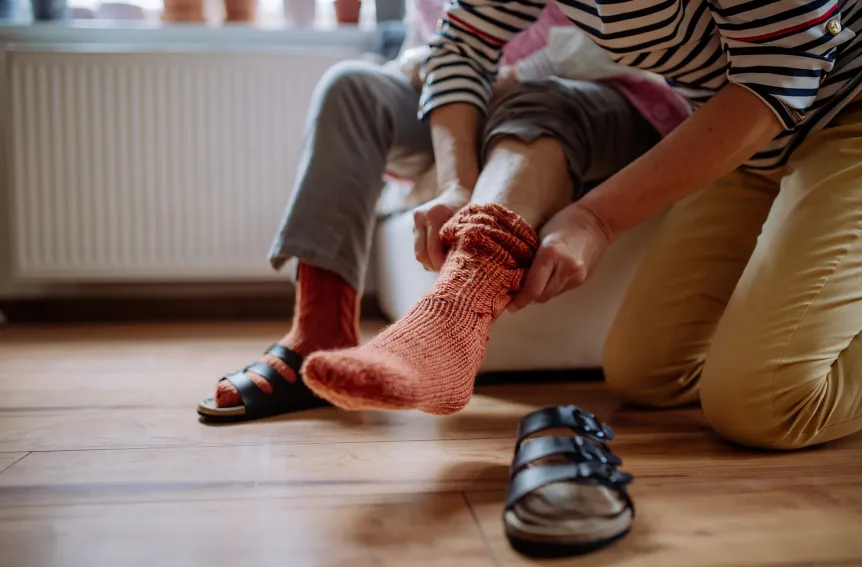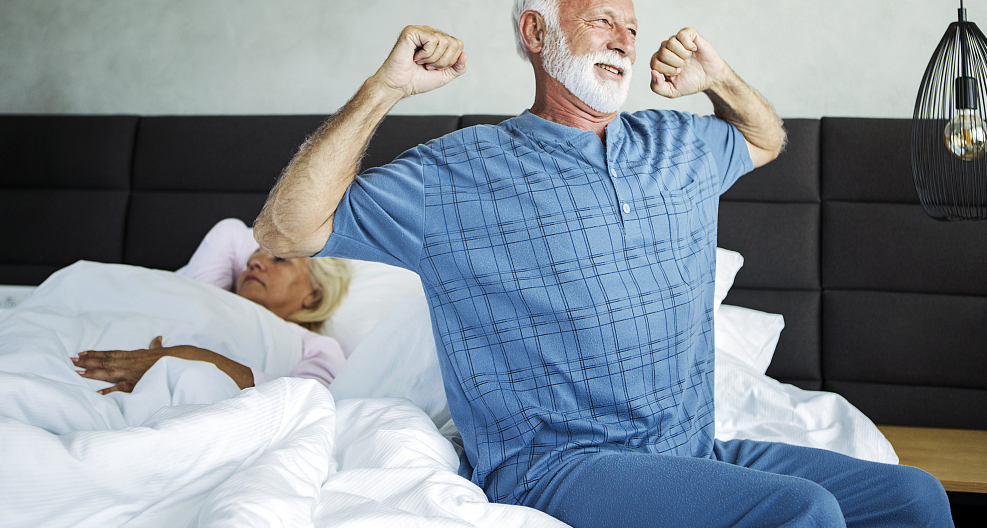Socks are a modern product. Since ancient times, people have known how to wrap a layer of cloth around their feet to reduce friction between their feet and shoes to avoid injury. Ancient socks were also called "foot clothes" or "foot bags".
With the improvement of living standards, modern socks have also been "upgraded". In addition to protecting the feet from injuries, they have also been greatly improved in terms of comfort and warmth. Many people wear socks when they go to bed at night. Is it true that wearing socks to sleep can help you sleep better?
01 Wearing socks to bed may help you fall asleep faster
If you have trouble falling asleep, please note that wearing socks to bed may help you fall asleep 15 minutes earlier and wake up less often at night.
Studies have found that wearing socks to bed can not only help you fall asleep faster, but also increase your sleep time by 30 minutes. The key point is that the number of nighttime awakenings is reduced by 50%. This is good news for people who often wake up in the middle of the night.

Researchers say that during the day, the body temperature of a person is around 37°C. After falling asleep at night, the core body temperature will drop by 1.2°C. The faster the core temperature drops, the faster a person will fall asleep.
The palms and soles of a person's feet are "radiators" that regulate body temperature by controlling the expansion and contraction of blood vessels. Wearing socks when sleeping can promote the expansion of blood vessels in the soles of the feet. Compared with bare feet, it can dissipate heat faster, lower the core temperature, and make people fall asleep faster.
The researchers also speculated that wearing socks when sleeping will affect the nervous system. When there is a temperature difference between the core temperature and the foot temperature, the neurons will increase the discharge frequency, which is related to the brain entering slow-wave sleep and deep sleep. In other words, wearing socks when sleeping can promote the discharge of neurons, make people sleepy, and help maintain sleep.

02 What should I pay attention to when wearing socks to sleep?
Choose the right size socks
When wearing socks to sleep, there are some points to note, such as choosing socks of the right size. Some people have big feet, but the socks they choose are not elastic, and they are relatively small, so they feel very tight when wearing socks. If you wear socks that are too tight and uncomfortable, it will be difficult to maintain high-quality sleep. You will feel that your feet are obviously restrained, which makes people feel uncomfortable.
Moreover, socks that are too tight will affect the normal blood circulation of the feet, causing local squeezing and compression, so you should choose the right socks according to the length of your feet.
People with sweaty feet should choose socks with good sweat absorption performance. Some people often sweat on their feet. When they wear socks during activities, they will feel damp on the soles of their feet. In this process, they may produce unpleasant odors and even breed bacteria. In this case, you should pay attention to the choice of socks and choose those with good materials that can help absorb sweat and have good breathability.
Under the premise of proper material selection, sweaty feet can be alleviated. Otherwise, wearing socks to sleep will cause a lot of sweating and bacteria breeding due to sweaty feet, which will affect skin health.
It is best to choose cotton socks because wearing socks can keep your feet warm and ensure good blood circulation, which can improve insomnia. However, it does not mean that any socks can be used. If you do not choose cotton socks, but wear silk socks, this effect will be difficult to play.
Silk socks are mostly used as accessories and do not have a very obvious warming effect, especially those transparent and thin silk socks, which basically cannot keep warm after wearing them. Wearing socks to sleep in this way will not help improve sleep quality, so cotton socks should also be chosen.

03 What other ways can help you sleep?
Sleep is very important for physical health. It can help the body restore energy, maintain immune system function, improve mental health, etc. However, many people cannot fall asleep at night or have poor sleep quality. Here are some ways to help you sleep:
Relax before bed
Performing relaxing activities before bed, such as meditation, deep breathing, stretching, and taking a bath, can help reduce stress and anxiety and make it easier for you to fall asleep. You can try different relaxation techniques to find the method that works for you.
Sleeping environment
A comfortable sleeping environment can make it easier for you to fall asleep and improve the quality of your sleep. Make sure the room temperature is appropriate, the mattress and pillows are comfortable, and reduce noise and light interference. You can use tools such as dark curtains and earplugs to improve the sleeping environment.
Regular sleep schedule
Maintaining a regular sleep schedule can help the body establish a healthy sleep pattern. Try to go to bed and get up at the same time, even on weekends. This helps the body's internal clock adjust to the right rhythm.
Avoid excessive stimulation
Avoid stimulants such as caffeine, alcohol, and smoking before bed to avoid affecting sleep. In addition, avoid excessive use of electronic devices, such as mobile phones, televisions, etc., which can affect the secretion of melatonin and thus affect sleep.
Exercise
Moderate exercise can help the body relax and improve sleep quality. However, it should be noted that exercise should be done during the day. If you exercise before going to bed, it may cause physical excitement and affect sleep.
Eating a healthy diet can also help improve sleep. Avoid eating too much food before going to bed, especially heavy-tasting food, which may cause gastrointestinal discomfort and affect sleep. In addition, you can eat foods rich in magnesium, tryptophan and other ingredients, such as oatmeal, bananas, almonds, etc. These foods can help the body relax and promote sleep.
(Images from the internet)





